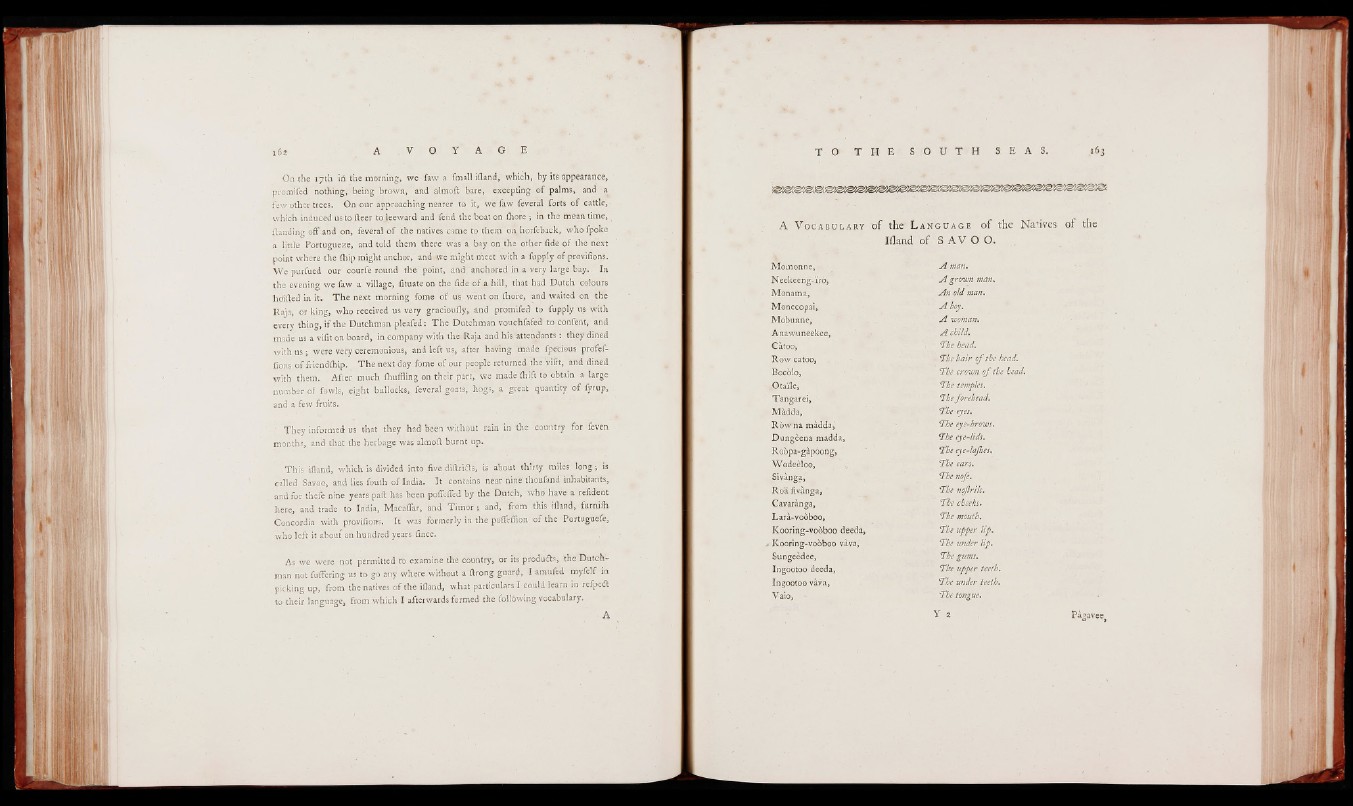
On the 17th iri the morning, we faw a fmall iiland, which, by its appearance,
promifed nothing, being brown, and almoft bare, excepting of palms, and a
few other trees. On our approaching nearer to it, we faw feveral forts of cattle,
which induced us to fteer to.leeward and fehd the boat on ihore j in the mean time,
{landing off and on, feveral of the natives came to them on, horfeback, who fpoke
a little Portugueze, and told them there was a bay on the other fide of the next
point where the (hip might anchor,' and we might meet with a fupp'ly of provifions.
We purfued our courfe round the point, and anchored in a very large-bay., In
the evening we faw a village, fituate on the fide of a hill, that had Dutch colours
hdifted in it. The next morning fome of us went on ihore, and waited on the
Kara» or king, who received us very graciouily, and promifed to fupply us with
every thing, if the Dutchman pleafed: The Dutchman vouchfafed to confent, and
made us a vifit on board, in company with the Raja and his attendants : they dined
with us j were very ceremonious, and left us, after having made fpecious profef-
fions of friendihip. The next day fome of our people returned the vifit, and dined
with them. After much ihuffling on their part, we made fhift to obtain a large
number of fowls, eight bullocks, feveral goats, hogs, a great quantity of fyrup,
and a few fruits.
They informed us that they had been without rain in the country for feven
months, and that the herbage was almoft burnt up.
This iiland, which is divided into five diftrifls, is about thirty miles long j is
called Savoo, and lies fouth of India. It contains near nine thoufand inhabitants,
and for theie nine years paft has been poffeffed by the Dutch, who have a refident
here, and trade to India, Macaffar, and Timor j and, from this iiland, furniih
Concordia with provifions. It was formerly in the poffeflion of the Portuguefe,
who left it about an hundred years fince.
As we were not permitted to examine the country, or its produdts, the Dutchman
not differing us to go any where without a ftrong guard, I amufed myfelf in
picking up, from the natives of the iiland, what particulars I could learn in refpedt
to their language, from which I afterwards formed the following vocabulary.
A
A V o c a b u l a r y o f the L a n g u a g e of the Natives o f the
Iiland o f S A V O O.
Momonne, _
Neekeeng-iró,
Monarna,
Monecopai,
Mobunne,
Anawuneekee,
Gàtoo,
Row catoo,
Bocòlo,
Otaïle,
Tangarei,,
Màdda',
Row na màdda,'
Dungèena madda,
Roòpa-gàpóong,
Wodeèloo,
Sivàngaf
Roâ fivànga,
Cavarànga,
Larà-voòboo,
Kooring-voòboo deeda,
Kooring-voòboo vàva,
Sungeèdee,
Ingoótoo deeda,
Ingootoo vàva,
Vaio, '
A man.
A grown man»
An old man.
A boy .
A woman.
A ch ild.
'The head.
‘The hair of the head.
'Thè crown of the head.
The temples.
The forehead.
The-eyes.
The eye-brows.
The ey e-lids.
The eye-lajhes.
The ears. *
The nofe.
The noftrils.
The cheeks.
The mouth.
The upper lip.
The under lip.
The gums.
The upper teeth .
The under teeth.
The tongue.
Pàgavee